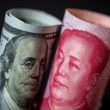On Monday, the Chicago Mercantile Exchange [CME] kickstarted options trading for Chinese yuan futures. The launch comes on the heels of rising demand and the derivatives’ group is looking to cater to the same. This offshore-traded Chinese yuan product will trade under the “CNH” ticker.
Also Read: BRICS Are Developing a New Currency: State Duma Deputy Chair
A recent Reuters report brought to light that similar exchange-traded options are being offered in Hong King since 2017. That said, CME’s latest product launch could increase the competition for the already existing players.
However, it should be noted that CME is a fairly smaller yuan-trading hub when compared to Hong Kong. According to Reuters’, a few traders who trade both OTC and exchange-based options feel that it could take time for volume to bloom.
Also Read: Hong Kong Fund To Raise $100 Million For Crypto Startups
Stalwarts weigh-in
Mukesh Dave, Chief Investment Officer at Aravali Asset Management, a Singapore-based hedge fund said,
“Trading volume of FX contracts remains a struggle for many exchanges, which are largely dominated by retail traders and very few large banks participate as market maker.“
Nevertheless, Tim Brooks, London-based Head of FX options at Optiver—which will deal in the new CME derivatives, opined,
“We hope to see liquidity develop there that’s comparable to the over-the-counter market.”
Chris Povey, CME Group’s Executive Director of FX Products based in London revealed that customers—right from investment institutions to small-time traders—were reportedly “interested” in exchange-traded yuan products. Further commenting on the evolution of the forex market, Povey added,
“Many traders no longer view CNH as an emerging market currency like it was ten years ago.”
Notably, the CME options have a host of expiry dates that range from from weekly to monthly and yearly. They are reportedly based on futures contracts with a notional amount of $100,000.
Also Read: U.S. Failed At Regulating Crypto: People’s Bank of China Official





